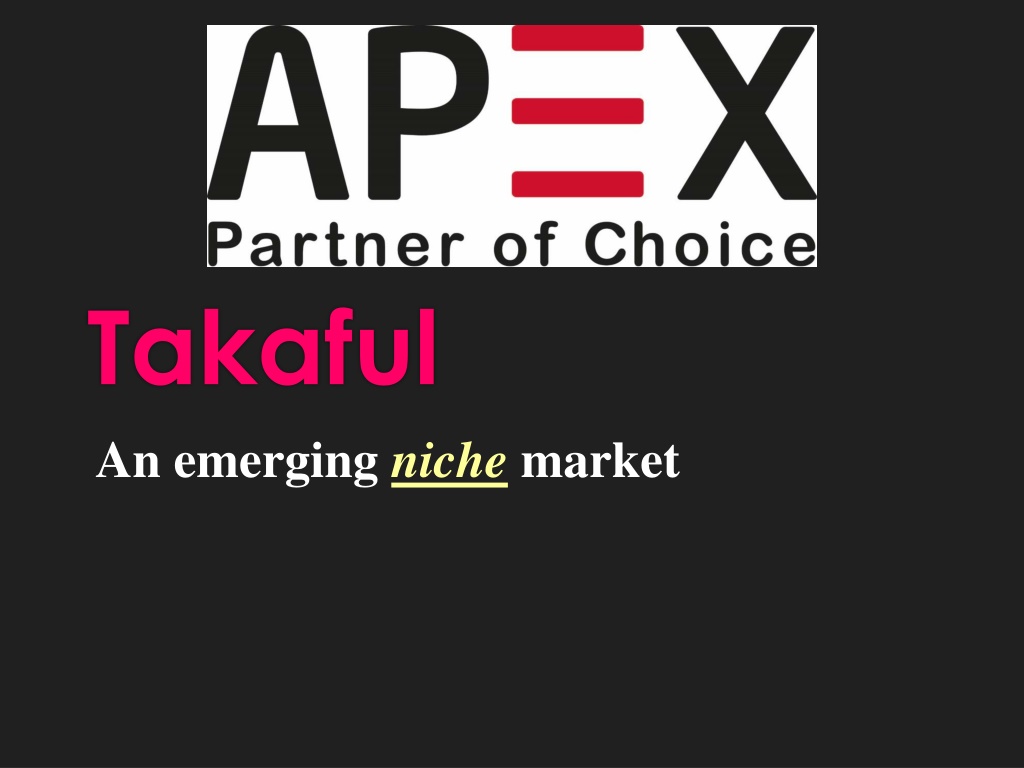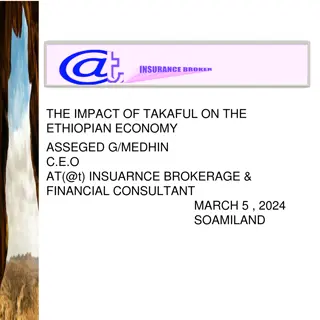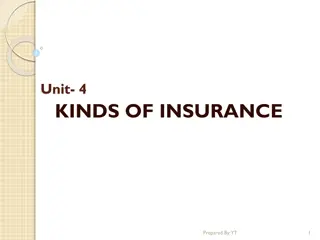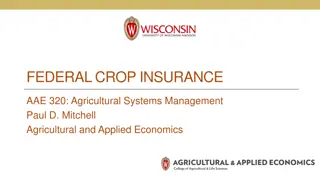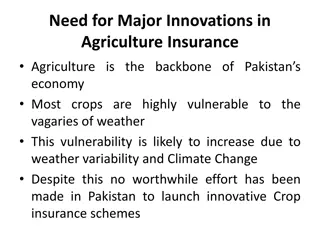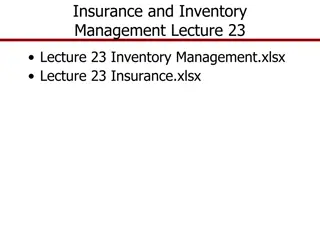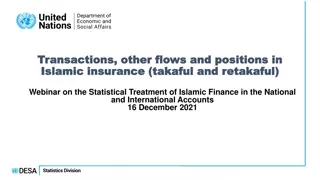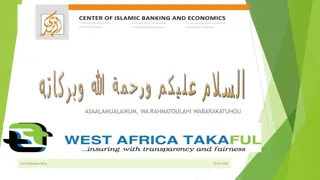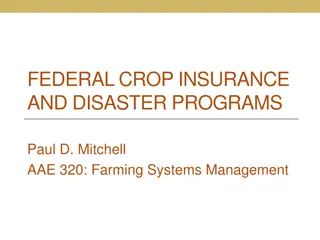Unveiling Takaful: A Unique Insurance Alternative
Delve into the concept of Takaful as it emerges in the insurance landscape, exploring objections to conventional insurance, the fundamentals of insurance contracts, and the Islamic perspective on uncertainty and risk in insurance practices.
Download Presentation

Please find below an Image/Link to download the presentation.
The content on the website is provided AS IS for your information and personal use only. It may not be sold, licensed, or shared on other websites without obtaining consent from the author.If you encounter any issues during the download, it is possible that the publisher has removed the file from their server.
You are allowed to download the files provided on this website for personal or commercial use, subject to the condition that they are used lawfully. All files are the property of their respective owners.
The content on the website is provided AS IS for your information and personal use only. It may not be sold, licensed, or shared on other websites without obtaining consent from the author.
E N D
Presentation Transcript
Takaful An emerging niche market
Outline of Presentation Objections to Conventional Insurance Introduction to Takaful Difference b/w Conventional Insurance & Takaful Takaful Through Time Takaful Models Takaful Types ReTakaful Challenges to Takaful
Objections to Conventional Insurance
Insurance Defined Definition of an Insurance Contract An agreement whereby one party, the insurer, in return for a consideration, the premium, undertakes to pay to the other party, the insured, a sum of money or its equivalent in kind on the happening of a specified event, which is contrary to the insured s financial interest Subject-matter of an Insurance Contract what is it that is insured in a fire policy? Not the bricks and materials used in building the house, but the financial interest (i.e. money) of the insured in the subject-matter of insurance (Lord Justice Brett in Castellian v. Preston 1883)
Objections to Conventional Insurance Scholars view the insurance contract as an exchange contract money is being exchanged for money over time. This brings about the problem of gharrar (which leads to maisir) and in investments aspect, riba. Elements of: Uncertainty Gharrar Gambling Maisir Interest Riba UW + Investment Profit belongs to the Company Note that the Scholars do not object to insurance per se but only to certain weaknesses in the insurance contract.
Uncertainty Gharrar Conventional insurance contract is basically a contract of exchange (mu awadat) i.e. buying and selling whereby policy (indemnity) is sold as goods, with the premium as the price or consideration. The consideration must be certain for exchange contract. Gharrarin insurance contracts pertains to deliverability of subject matter, i.e. uncertainty as to: Whether the insured will get the compensation promised? How much the insured will get? When will the compensation be paid? Thus, it involves an element of uncertainty in the subject matter of the insurance sales contract, which renders it void under the Islamic law.
Insurance is a contract upon speculation. Good faith forbids either party from concealing what he privately knows, to draw the other into a bargain, from his ignorance of that fact, and his believing to the contrary (Lord Mansfield in Carter v. Boehm 1766). Gambling Maisir The insured loses the money paid for the premium when the insured event does not occur. The company will be in deficit if claims are higher than premium.
Interest Riba . Allah has permitted trading and forbidden riba (Al Baqarah 2 : 275). Insurance funds are invested in financial instruments which contain the element of Riba.
Takaful comes from the Arabic root-word kafala guarantee. Meaning of Takaful Takaful means mutual protection and joint guarantee. Operationally, takaful refers to participants mutually contributing to a common fund with the purpose of having mutual indemnity in the case of peril or loss.
Help (taawan) one another in furthering virtue (birr) and Allah consciousness (taqwa) and do not help one another in furthering evil and enmity . Al Maidah: verse 2 (5:2). Reference Al Quran: Takaful is a form of mutual help (ta awun) in furthering good/virtue by helping others who are in need / in hardship .
tie the camel first, then submit (tawakkal) to the will of Allah The hadith implied a strategy to mitigate/reduce risk. Reference Hadith: Takaful provides a strategy of risk mitigation/reduction by virtue of collective risk taking that distributes risks and losses to a large number of participants. This mitigates the otherwise very damaging losses, if borne individually.
Declaration by Shariah scholars rendering conventional insurance un-Islamic Unanimous resolutions and fatwa by Ulama in the Muslim League Conference in Cairo in 1965. Fatwa issued in Judicial Conference held in Makkah in Shaban 1398 AH. 27 Dec. 1926 6 May 1972 1398 1965 Verdict of Supreme Court of Egypt on Dec. 27, 1926. Unanimous decision by Muslim Scholars in seminar held in Morocco on May 6, 1972.
Judicial Opinions and Fatwas confirming validity of Takaful Fatwa issued by Higher Council of Saudi Arabia in 1397 A.H. Fatwa issued by the Fiqh Council of the OIC in 1405 A.H. (1985). 1397 1405 1398 Fatwa Issued by the Fiqh Council of Muslim World League in 1398 A.H.
Islamic Fiqh (science of Shariah) Academy, emanating from the Organization of Islamic Conference, meeting in its Second Session in Jeddah, KSA, from 10 to 16 Rabi-ul- Thani, 1405 A.H. (Dec 1985) issued a Resolution which in summary stated the following: Fiqh Academy Resolution 1985 The commercial Insurance contract is prohibited (Haraam) according to the Shariah. The alternative Takaful contract which conforms to the principles of Islamic dealings is Halaal, being the contract of cooperative insurance, which is founded on the basis of charitable donation and Shariah compliant dealings.
Mutuality and cooperation. Takaful contract pertains to Tabarru at as against mu awadat in case of conventional insurance. Payments made with the intention of Tabarru (contribution) Basic Eliminates the elements of Gharrar, Maisir and Riba. Elements of Takaful Wakalah/Modarabah basis of operations. Joint Guarantee / Indemnity amongst participants shared responsibility. Constitution of separate Participants Takaful Fund . Constitution of Shariah Supervisory Board. Investments as per Shariah.
Piety (individual purification) Main drivers of Takaful Brotherhood (mutual assistance) Charity (Tabarru or contribution) Mutual Guarantee Community well-being as opposed to profit maximization.
Comparing Takaful to Conventional Insurance Issue Conventional Insurance Takaful Organization Principle Profit for shareholders Mutual for participants Basis Risk Transfer Co-operative risk sharing Value Proposition Profits maximization Affordability and spiritual satisfaction Sharia plus regulations Laws Secular/Regulations Ownership Shareholders Participants Management status Company Management Operator Form of Contract Contract of Sale Cooperative, Islamic contracts of Wakala or Mudarbah with Tabar ru (contributions) Sharia compliant, Riba-free Investments Interest based Surplus Shareholders account Participants account
Origins in the First Constitution of Madina. Takaful through Time It evolved and continued in one form or the other throughout the Abbaside period and even later during the Ottoman empire. Serious efforts were made in modern times, in 1970s to come up with an Islamic alternative to the conventional insurance. The first Takaful company was set up in Sudan in 1979, almost simultaneously followed by another one set up in Bahrain.
Takaful through Time (Contd.) There are now 200+ Takaful companies round the globe. The total global insurance premium for 2017 was USD 4891 Billion; of this, Takaful contribution accounts for 5% (i.e. USD 20 Billion). This is expected to increase to USD 40 Billion by 2021. Poor Insurance penetration in the Muslim countries (<1% of GDP). Average growth rate higher than conventional insurance companies (around 25%). Non Muslims increasingly opting for Takaful products for commercial benefits.
The surplus is shared between the participants with a takaful operator. The sharing of such profit (surplus) may be in a ratio 5:5 , 6:4 etc. as mutually agreed between the contracting parties. Generally, these risk sharing arrangements allow the takaful operator to share in the underwriting results from operations as well as the favourable performance returns on invested premiums. Mudaraba Model
Profits attributable to Shareholders Mudaraba Model Company s Admin. & Mangt. Expenses Company Investment By Company Profit From Investments Company s Share from Surplus Takaful Contributio n paid by Participant General Takaful Fund General Takaful Fund Operational Cost of Takaful Surplus (Profit) Participant Participant s Share from Surplus
Cooperative risk sharing occurs among participants where a takaful operator earns a fee for services (as a Wakeel or Agent) and does not participate or share in any underwriting results as these belong to participants as surplus or deficit. Under the Al- Wakala model, the operator may also charge a fund management fee and performance incentive fee. Wakala Model
Wakala Model Mudarib's Share of PTF s Investment Income Profit From Investments Profit/Loss attributable to Shareholders Wakala Fee (30% to 35%) Management Expense of the Company Company (Capital) Takaful Contribution Investment by the Company paid by Participant Operational Cost of Takaful/ ReTakaful Surplus Distribution to Participants General Takaful Fund Participants Surplus (Profit) Investment Income Reserves Takaful Fund
Wakala -Waqf Model It is a WAKALAH model with a separate legal entity of WAQF in- between. The relationship of the participants and the operator is directly with the WAQF fund. The operator is the Wakeel of the fund and the participants pay contribution to the WAQF fund by way of Tabarru. The contributions received would also be a part of this fund and the combined amount will be used for investment and the profits earned would again be deposited into the same fund which also eliminates the issue of Gharar. Losses to the participant are paid by the company from the same fund. Operational expenses that are incurred for providing Takaful services are also met from the same fund.
Wakala-Waqf Model S H A R E H O L D E R S F U N D (S.H.F.) Share Holder Mudarib s Share of PTF s Investment Income Management Expense of the Company Wakalah Fee Investmen t Income Profit/Loss Takaful Operator Investment by the Company WAQF Claims & Reserves Operational Cost of Takaful / ReTakaful Surplus (Balance) Investment Income P A R T I C I P A N T S T A K A F U L F U N D (P.T.F.) Participant
Models The beauty of Islam lies in its plurality !
ISLAM SHARIAH Practices & Activities AQIDAH Faith & Belief AKHLAQ Moralities & Ethics IBADAH Man-to-God Worship MUAMALAT Man-to-Man Activities Political Activities Economic Activities Social Activities Risk Management Takaful
General Takaful offers all kinds of non-life risk coverage. It is normally divided into following classes: General Takaful Types Property Takaful Marine Takaful Motor Takaful Miscellaneous Takaful
Term Life Takaful Whole Life Takaful Types of Family Takaful Endowment Takaful Universal Takaful Marriage Plan Education Plan
Takaful Policy Document / Participants Membership Document Preamble: This is to acknowledge that the applicant (hereinafter called the 'Participant'), as more fully described in the schedule hereto: i. the 'Fund') operated by Takaful Pakistan Limited (hereinafter called the 'Company'). Is accepted as a member of the Participants' Takaful Fund (hereinafter called ii. the attached Indemnity Policy of the Fund, and of the benefits declared by the Fund from time to time under this policy, in accordance with the Waqf rules governing the Fund. Being a member of the Fund, he/she is acknowledged as a beneficiary under iii. with his/her undertaking under his/her declaration made in the proposal form, he/she is indemnified by the Fund as one of its beneficiaries against the perils/events described, in the manner and to the extent as stated hereunder. Subject to the participant continuing as a member of the Fund and complying
Takaful Policy Document / Participants Membership Document Duration: Normally policies are issued for the duration of twelve months. Extended coverage on project policies. MARINE POLICY : The membership under this document shall be for the period of _________ months. However, the benefits under this document, except Surplus if any, shall cease on the arrival of goods at destination.
Takaful Policy Document / Participants Membership Document Cancellation Clause: This Policy may at any time be terminated at the option of the Company, on 14 days' notice to that effect being given to the Participant at his last known address. In that case, the Participant shall be GIVEN an amount equivalent to a ratable proportion of the contribution for the unexpired Period of Policy from the date of such cancellation. This Policy my also be terminated at any time at the request of the Participant, in which case the Participant will be PAID an amount equivalent to the actual contribution made initially by him/her, less the amount worked as per the following scale applicable to the period during which the policy has been in force:
Takaful Policy Document / Participants Membership Document TAKAFUL OPERATOR'S FEE The Company shall deduct Takaful Operator's fee out of the Contribution received under this Policy. Such fee shall be based on the Wakala principle since the Company hereby acts as a Wakeel on behalf of the Fund. INVESTMENT MANAGEMENT SHARE The Company shall act as a Mudarib for the purpose of managing the investment of the Participant's Contribution. As such, the Company stands entitled to a share in the investment income thereof as Mudarib.
Takaful Policy Document / Participants Membership Document SURPLUS DISTRIBUTION If, at the end of the period of Policy stated in the Schedule, there is a surplus in the General Takaful Fund, the same shall be distributed among the Participants. Provided that, in case the Participant has made any claim or received any benefits under this Policy, that claimed amount shall be deducted from the net amount worked out as due to the Participant.
ReTakaful Currently few ReTakaful companies worldwide offering a relatively small capacity: Sudan (1979) National Reinsurance. Sudan (1983) Sheikhan Takaful Company. Tunis Retakaful Lloyds of London has a ReTakaful Syndicate. SwissRe has formed a separate ReTakaful Pool MunichRe ReTakaful Pool Hannover Retakaful Labuan Retakaful Saudi Re RGA Global Reinsurance Company Ltd MNRB Retakaful Berhad Malaysian Retakaful Kenya Retakaful Africa Retakaful Zep Re Retakaful Ethio Retakaful
TAKAFUL - TARGET MARKET People who do not insure due to religious reasons. People who insure and are insensitive to religious reasons. People who currently do not insure at all.
Challenges to Takaful Skepticism. Lack of uniformity in Shariah decisions. Regulatory issues. Capacity ReTakaful. constraints due to inadequate Limited Investment avenues. H.R. issues.
